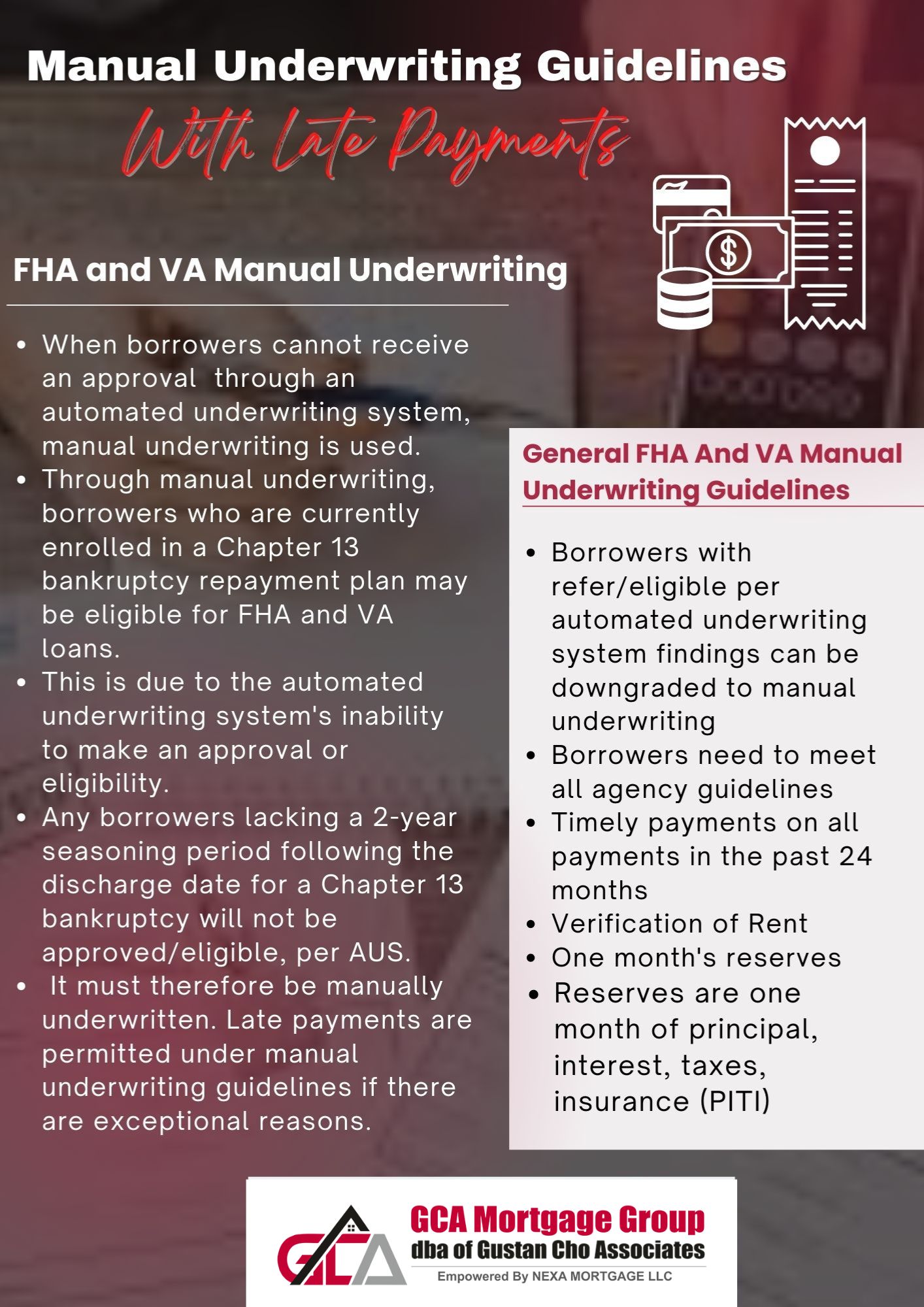Manual Underwriting Guidelines With Late Payments
This Article Is About Manual Underwriting Guidelines With Late Payments:
FHA and VA loans are the only two mortgage loan programs that allow for manual underwriting. Manual underwriting is when a borrower cannot get an approve/eligible per automated underwriting system. The file needs to be manually underwritten to a human underwriter. The borrower’s file is manually underwritten by a human underwriter and is considered a riskier loan.
There are additional lending guidelines on manual underwriting files. Debt to income ratio caps is lower than AUS-approved files. Gustan Cho Associates is one of the nation’s most aggressive lenders on manual underwrites. Gustan Cho Associates can approve manual underwrites with late payments in the past 12 months. Sometimes, we can qualify for VA and FHA manual underwrites with late payments in the past 12 months. However, the borrower will need strong compensating factors.
FHA and VA Manual Underwriting
FHA and VA Loans allow manual underwriting.
Manual Underwriting is when borrowers cannot get an approve/eligible per automated underwriting system. Borrowers who are in an active Chapter 13 Bankruptcy Repayment plan can qualify for FHA and VA Loans via manual underwriting.
This is because the automated underwriting system will not render an approve/eligible It will render a refer/eligible. There is no waiting period after the Chapter 13 Bankruptcy discharged date on FHA and/or VA Loans
Any borrowers without a 2-year seasoning after the Chapter 13 Bankruptcy discharged date will not get an approve/eligible per AUS. Therefore, it needs to be manually underwritten. Manual Underwriting Guidelines, Late Payments is allowed with extenuating circumstances. In this blog, we will discuss getting approved for FHA and VA Loans Manual Underwriting Guidelines.
Per Manual Guidelines With Late Payments, it is possible to get approved for FHA and VA Home Loans with manual underwriting with late payments due to extenuating circumstances. However, it is next to impossible to get any mortgage underwriter to approve a mortgage with late payments in the past 12 months.
General FHA And VA Manual Underwriting Guidelines
FHA and VA Loans are the only two loan programs that will accept manual underwriting. Both FHA and VA manual underwriting guidelines are the same.
Here are the general FHA and VA Manual Underwriting Guidelines:
- Borrowers with refer/eligible per automated underwriting system findings can be downgraded to manual underwriting
- Borrowers need to meet all agency guidelines
- Timely payments on all payments in the past 24 months
- Verification of Rent
- One month’s reserves
- Reserves are one month of principal, interest, taxes, insurance (PITI)
Having timely active credit tradelines is important for manual underwriting. If you have had late payments in the past 24 months, it is key that you have active timely credit tradelines. Strong reserves and savings will help borrowers with late payments in the past 24 months. Lenders want to see strong savings for borrowers with late payments and prior bad credit. Outstanding collection and charged-off accounts do not have to be paid.
Manual Underwriting Guidelines With Late Payments On VA And FHA Loans
Late payments in the past 24 months are an automatic disqualification with manual underwriting by most lenders. Per Manual Underwriting Guidelines With Late Payments, borrowers are allowed late payment in the past 24 months with manual underwriting if they had extenuating circumstances.
Even though per Manual Underwriting Guidelines With Late Payments, late payments are allowed, more than 99% of the lenders will not want to touch it.
Great News.
Gustan Cho Associates are national lenders with no overlays on government and conventional loans. We have done countless manual underwriting with late payments in the past 24 months on FHA and VA Loans.
This is not a guarantee. Borrowers need to have extenuating circumstances and supporting documents. Our loan officers will help borrowers write a good letter of explanation concerning the extenuating circumstances.
What Are Extenuating Circumstances?
Extenuating Circumstances are hardships in one’s life that caused an interruption in steady income. Due to this hardship, borrowers had a loss of income. Therefore, they were late on their monthly debt and affected their credit. Divorce is not an extenuating circumstance. National disasters such as a tornado, hurricane, wildfires, floods, and other Presidential Declared Disasters are considered as an extenuating circumstance.
Death, a major illness, and loss of a job are considered extenuating circumstances. To use extenuating circumstances as a reason for late payments in the past 24 months, borrowers need to provide supporting documents and a letter of explanation. For more information, contact us at Gustan Cho Associates at 800-900-8569 or text us for a faster response. Or email us at gcho@gustancho.com. We are available 7 days a week, evenings, weekends, and holidays.
Evaluating Late Payments
Criteria Underwriters Use to Assess Late Payments
When evaluating late payments, underwriters consider several critical criteria to determine a borrower’s overall risk and creditworthiness. These criteria include:
- Frequency of Late Payments:
- Definition: How often late payments have occurred within a specific period.
- Impact: Borrowers with multiple late payments may be viewed as more risky than those with occasional late payments.
- Severity of Late Payments:
- Definition: The extent to which payments were late, categorized by the number of days past due.
- Impact: More severe late payments (e.g., 90 days past due) are considered a higher risk than less severe ones (e.g., 30 days past due).
- The recency of Late Payments:
- Definition: How recently have the late payments occurred?
- Impact: Recent late payments are typically more concerning to underwriters than older ones, indicating more current financial instability.
- Types of Accounts with Late Payments:
- Definition: The nature of the accounts on which late payments occurred (e.g., mortgage, credit card, auto loan).
- Impact: Late payments on mortgage accounts are often weighed more heavily than revolving credit accounts, as they directly reflect the borrower’s ability to manage housing-related debt.
Importance of the Reasons Behind Late Payments
Underwriters also consider the reasons for late payments to comprehensively understand the borrower’s financial situation. Valid and understandable reasons for late payments can significantly influence the underwriter’s decision. Common reasons include:
- Temporary Financial Hardship:
- Examples: Job loss, medical emergencies, temporary disability, or other unexpected financial setbacks.
- Impact: If the borrower can demonstrate that the hardship was temporary and has since been resolved, underwriters may be more lenient.
- Documentation and Explanation:
- Explanation Letter: A detailed letter from the borrower explaining the circumstances leading to the late payments.
- Supporting Documents: Medical bills, job termination notices, disability letters, or any other relevant documentation that supports the borrower’s explanation.
- Current Financial Stability:
- Improvement Evidence: Proof of current financial stability, such as a stable job, consistent on-time payments since the late period, and an overall healthy financial situation.
- Future Risk Mitigation: Demonstrating steps to avoid future late fees, such as setting up automatic payments or creating an emergency fund.
- Unique Circumstances:
- Natural Disasters: Situations such as natural disasters affect the borrower’s ability to make timely payments.
- Family Emergencies: Serious family emergencies that led to financial disruptions.
By evaluating these criteria and understanding the reasons behind late payments, underwriters can make a more informed decision about the borrower’s ability to manage future mortgage payments. This comprehensive evaluation helps differentiate between borrowers who pose a high risk and those who have experienced temporary setbacks but are otherwise financially responsible.
Manual underwriting is when a human underwriter reviews a mortgage application rather than relying solely on automated underwriting systems (AUS). This process allows for a more personalized evaluation of the borrower’s financial situation, especially when there are complexities such as late payments.
2. How does manual underwriting differ from automated underwriting?
Automated underwriting relies on algorithms to quickly assess a borrower’s risk based on credit scores, income, debt levels, and other factors. On the other hand, manual underwriting involves a detailed review by an underwriter who can consider additional factors and explanations that an automated system might overlook.
3. Can I get a mortgage with late payments on my credit report?
Yes, getting a mortgage with late payments on your credit report through manual underwriting is possible. Lenders will look at the overall context of your financial situation, including the reasons for the late payments and your recent payment history.
4. What factors do underwriters consider with late payments during manual underwriting?
Underwriters will consider several factors, including:
Frequency and Severity: How often and how late were the payments made?
Recency: How recently have the late payments occurred?
Reasons: Any documented reasons for the late payments, such as temporary financial hardship or unexpected events.
Current Payment History: Recent payment behavior and improvements in managing debt.
Overall Credit Profile: Your credit history, including other positive credit behaviors.
5. What documentation might I need to provide for manual underwriting with late payments?
You may need to provide:
Explanation Letter: A detailed letter explaining the reasons for the late payments and how your financial situation has improved.
Supporting Documents: Proof of events that caused the late fees, such as medical bills, job loss, or other financial hardships.
Current Financial Information: Up-to-date income documentation, bank statements, and evidence of current on-time payments.
6. How do late mortgage payments specifically affect manual underwriting?
Underwriters take late mortgage payments seriously, as they indicate a higher risk of default. However, if you can demonstrate that the late payments were due to a temporary situation and have since been resolved, and your overall financial profile is strong, an underwriter may still approve your mortgage application.
7. What are compensating factors, and how can they help with late payments?
Compensating factors are favorable elements of your financial situation that can mitigate the adverse effects of late payments. These might include:
High Income: Steady, reliable income that exceeds the minimum requirements.
Higher Down Payment: A substantial down payment can lessen the lender’s risk.
Low Debt-to-Income Ratio: A lower ratio shows you manage your debts well relative to your income.
Significant Savings: Demonstrating substantial savings can provide assurance of financial stability.
8. Are there specific loan programs that are more lenient towards late payments?
Some loan programs may be more flexible with late payments, particularly those designed for borrowers with less-than-perfect credit. These include:
FHA Loans: The Federal Housing Administration offers programs with more lenient credit requirements.
VA Loans: VA loans can be more accommodating for eligible veterans and active-duty military personnel.
Non-QM Loans: Non-Qualified Mortgage (non-QM) loans cater to borrowers who don’t meet traditional lending criteria.
9. How long do late payments stay on my credit record?
Late fees can stay on your credit report for up to seven years. However, their impact on your credit score diminishes, especially if you maintain a good payment history afterward.
10. Can I improve my chances of approval despite late payments?
Yes, you can improve your chances by:
Improving Credit Behavior: Make all your current payments on time and reduce existing debt.
Providing Compensating Factors: Highlight strengths in your financial profile.
Writing a Clear Explanation: Clearly explain the reasons for late payments and how your situation has improved.
Consulting a Mortgage Professional: Work with a lender experienced in manual underwriting who can guide you through the process.
11. What should I include in my explanation letter for late payments?
Your explanation letter should include:
Honest Explanation: A clear, truthful reason for the late payments.
Resolution: Steps you have taken to resolve the issue.
Current Financial Stability: Evidence of your financial stability and commitment to timely payments.
12. Can late payments disqualify me from all mortgage options?
Not necessarily. While late payments can complicate the approval process, they do not automatically disqualify you from all mortgage options. Manual underwriting can provide an opportunity to explain your situation and demonstrate your creditworthiness in other ways.









